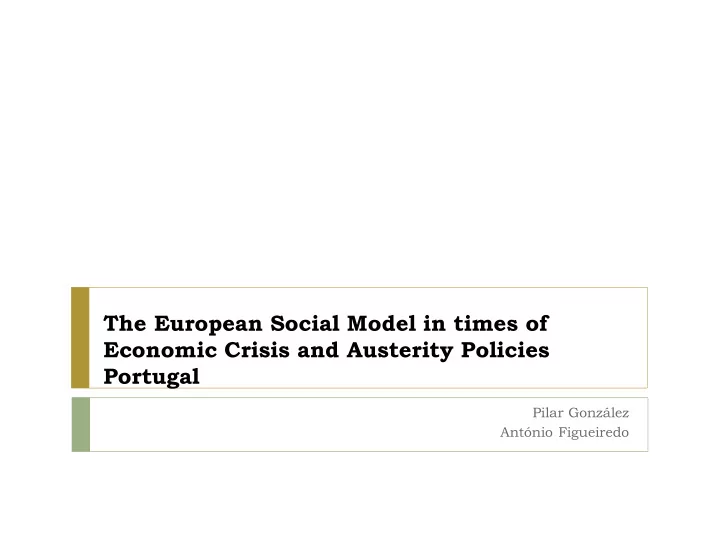

The European Social Model in times of Economic Crisis and Austerity Policies Portugal Pilar González António Figueiredo
Portuguese Social Model Historical context Recent realization and Context dependence A contemporary manifestation of 1974 revolution 1976 Constitution: simultaneously ended the unstable post Revolution period and started democracy consolidation in Portugal very generous as far as social rights are concerned, being a complex mix of social and political influences, strongly marked by the revolutionary social dynamics generated by the military cup EU accession in 1986 Unbalanced : compromise between social policy achievements in the last period of the autocratic regime and new developments generated by democratic aspirations and the influence of the integration into the EU An encompassing model 2
Portuguese Social Model Pillars Public education system National health system Social protection Combination of a contributive and a non-contributive (social) system Labour market regulation 3
To keep in mind Before 2008, Portugal was undergoing a process of structural change: Adjustment of the productive specialisation profile to reglobalisation and overvalued Euro Painful transition from a period of high employment creation in non-skilled and low wage jobs towards more skilled jobs, matching progresses in secondary and tertiary education Need to stop or at least reverse the allocation of private and public resources towards non-tradable sectors 4
Portuguese Social Model The reforms of the 2000s: targeted at combining equity and efficiency Labour market regulation: important changes based on Social Dialogue Social Security (namely pensions): important changes based on Social Dialogue Education and Health: rationalising the system POSITIVELY EVALUATED BY OECD, IMF and EUROPEAN COMMISSION 5
Crisis and MoU: some empirical evidence GDP growth rate and Gini coefficient of equivalised unemployment rate: disposable income 1999-2012 39 20 37 15 35 33 10 31 5 29 27 0 25 1995 1996 1997 1998 1999 2000 2001 2002 2003 2004 2005 2006 2007 2008 2009 2010 2011 2012 -5 European Union (15 countries) Portugal GDP growth rate, constant prices unemployment rate Source: EUROSTAT Source : PORDATA 6
Redistribution of income: income share 7.6 55 7.4 50 7.2 7 45 6.8 40 6.6 6.4 35 6.2 6 30 2004 2005 2006 2007 2008 2009 2010 2011 2012 2004 2005 2006 2007 2008 2009 2010 2011 2012 Decile 1+2 decile 3 to 8 decile9+10 MoU: new dynamics of income distribution between groups 7 Source: EUROSTAT
But also in absolute terms… annual growth rate of the cut-off income, Portugal 2009 2010 2011 2012 Decile 1 2,9% 5,5% -3,4% -2,6% Decile 2 4,5% 4,9% -2,0% -0,3% Decile 3 4,0% 3,4% -1,7% -1,1% Decile 4 2,3% 3,4% -1,5% -1,8% Decile 5 1,7% 4,8% -3,1% -1,0% Decile 6 0,8% 6,0% -3,8% -1,4% Decile 7 1,8% 4,6% -2,4% -2,5% Decile 8 -1,3% 2,3% -1,8% -1,5% Decile 9 -1,5% 3,0% -2,7% -1,7% 8
But also in absolute terms… annual growth rate of the cut-off income, Portugal 2009 2010 2011 2012 Decile 1 2,9% 5,5% -3,4% -2,6% Decile 2 4,5% 4,9% -2,0% -0,3% Decile 3 4,0% 3,4% -1,7% -1,1% Decile 4 2,3% 3,4% -1,5% -1,8% Decile 5 1,7% 4,8% -3,1% -1,0% Decile 6 0,8% 6,0% -3,8% -1,4% Decile 7 1,8% 4,6% -2,4% -2,5% Decile 8 -1,3% 2,3% -1,8% -1,5% Decile 9 -1,5% 3,0% -2,7% -1,7% National Income decreased It decreased differently in different income groups 9
The shrinking of the middle class? Very unequal country Income cuts (wages, social security benefits, pensions) High unemployment even among the high qualified Wage cuts of public sector workers: a main cause of deterioration of the middle class Income cuts + weakened prestige Uncertainty and insecurity Freezing careers Political speech emphasizing a duality between the protected civil servants and the others; Circle: deterioration of public careers; demotivation Increased homogeneity within income groups Significant fall of upward social mobility 10
Main conclusions The Portuguese economy was under a strong structural change before the crisis Austerity policies negatively extended the penalizing effects of the financial international crisis Bail-out measures should not ignore the development stage of the economy: dismantling the recent and vulnerable dimensions of the ESM in a context of strong demand for social protection had very high and not recoverable costs Fiscal consolidation of small euro-zone economy not feasible without a solution for the euro zone as a whole Portugal faces the emergence of strong dynamic negative effects 11
What negative dynamic effects? Inefficient allocation of resources: Returns of education investments by families are falling and there is a risk of inversion of behaviour of families Wages fall are a bad incentive to innovation: dynamic efficiency is penalized Social cohesion is undermined and long term unemployment risks to turn into structural and permanent unemployment Social Dialogue is loosing visibility: risk of dismantling the previously accumulated trust capital Lack of trust in public and EU institutions: democracy in danger Growth potential strongly penalized 12
Recommend
More recommend